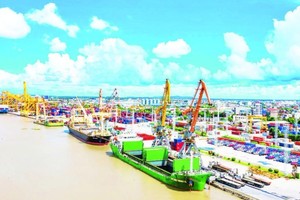 |
Lobster prices have dropped drastically as traders cease purchases. |
On November 7, the SGGP Newspaper reported that many lobster farms and export facilities in the Central region have either been unable to ship their tropical rock lobsters to China or have experienced an uptick in inspections and delays in the customs clearance process for green spiny lobsters (Panulirus homarus).
The Ministry of Agriculture and Rural Development (MARD) has disclosed that it recently received reports from several lobster export businesses located in provinces like Khanh Hoa, Phu Yen, and the Provincial Fisheries Association of Phu Yen on the temporary halt in tropical rock lobster imports by China. At present, the ministry's functional units have not received an official notification from the relevant Chinese authorities explaining the reasons behind the temporary suspension or the delayed customs clearance process.
Nonetheless, according to the lobster collection and export enterprises, the Chinese authorities have implemented stringent source control measures for lobsters imported from different nations, which includes the live tropical rock lobster exports from Vietnam.
According to a company in Cam Ranh (Khanh Hoa Province), their Chinese importing partner sent a letter stating, "Wild lobsters are an endangered species. Should a country desire to import cultured tropical rock lobsters, they are required to furnish the following documents before seeking an import permit: a certificate verifying the lobsters are farmed, a certificate evidencing the special management of wild aquatic animals in China, and a certificate authorizing the import of wild aquatic species originating from foreign countries."
Based on this information, it appears that Chinese authorities are increasing their efforts to control the origin of lobster imports into the Chinese market.
To align with this new Chinese policy, the Directorate of Fisheries under the MARD suggests that local authorities update their records with comprehensive information and keep relevant documents and records for easy source tracing as needed.
Over the past time, Vietnam's lobster market has mainly been dependent on exports to China through border trade. However, from September to the present, the export conditions have become extremely difficult, with the trade in live tropical rock lobsters coming to a halt. Additionally, other types of shrimp and seafood are experiencing heightened inspection rates, reaching as high as 50 percent.
With no export market available, lobster traders have ceased their collection activities, leading to distress among lobster farmers due to financial losses. Information from Khanh Hoa Province reveals that tropical rock lobsters are mainly cultivated in Van Phong Bay, Van Ninh District. Out of a total of 35,000 lobster cages in use for lobster farming in Van Ninh District, almost 50 percent are dedicated to tropical rock lobster farming, primarily concentrated in Van Thanh Commune. It is anticipated that approximately 400 tons of commercial tropical rock lobsters will need to be consumed from now until the year's end. Presently, prices have plummeted from VND1.6-2.1 million per kg to just around VND1.1 million.
The Department of Quality, Processing, and Market Development under the MARD has sent a dispatch to the Vietnamese Embassy and Trade Office in China, as well as the Nanning Customs Department of the General Administration of Customs of China, urging the resolution of this matter.
While waiting for the official response from the General Administration of Customs of China, the MARD has announced that, on November 15, a forum on the supply of breeding stock, source tracing, and sustainable marine farming solutions in Vietnam will be organized in Nha Trang City, Khanh Hoa Province. The forum's agenda will focus on sustainable tropical rock lobster farming solutions, source tracing for lobsters, and marine farming products.
























